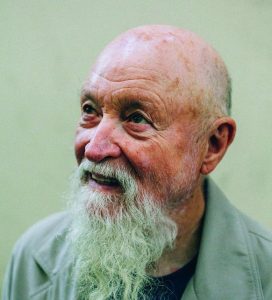Donderdag 15 september vond in Maastricht de aftrap plaats voor kunstenfestival Musica Sacra. Terwijl ik in de file stond, speelde Bobby Mitchell het achtste en laatste deel van de pianocyclus The Road van Frederik Rzewski, die zelf aanwezig was. Het vormde tevens de afsluiting van het festival van vorig jaar, dat gewijd was aan ‘de weg’, de tocht die pelgrims maken om een heilig oord te bereiken. Het huidige festival heeft als het thema ‘offer van liefde’, ik gaf hier vorige week al mijn vijf concerttips.

Nog net op tijd arriveerde ik in de Limburgse hoofdstad om de Nederlandse première te beleven van de integrale uitvoering van het strijkkwartet Salome Dances for Peace van Terry Riley in de St. Janskerk. Hij componeerde dit vijfdelige, ruim twee uur durende stuk tussen 1985-86 voor het Kronos Kwartet, dat naar verluidt drie jaar nodig had om de ritmisch zeer lastige partijen in te studeren.
Het Ruysdael Kwartet deed er aanzienlijk korter over: de vier strijkers begonnen pas in augustus met repeteren. Violist Joris van Rijn erkent dat ze de materie wellicht wat onderschat hadden: ‘Het bleek verdomd lastig, met veel onregelmatige maatsoorten en partijen die op een niet voor de hand liggende manier in elkaar grijpen. We hebben er ontzettend veel tijd aan besteed, niet alleen samen, maar ook in persoonlijke studie’.
Dat heeft zijn vruchten afgeworpen. Het ruim tachtigkoppige publiek luisterde in de St. Janskerk de volle tweeënhalf uur ademloos naar Salome Dances for Peace. Slechts twee keer kregen wij – en de musici – kort de gelegenheid de benen te strekken. Daarna ging het kwartet onvermoeibaar voort, met bewonderenswaardige inzet, precisie en aanstekelijke speelvreugde.
Muzikale wereldreis
Wie bij Terry Riley denkt aan minimalisme à la Glass of Reich, werd verrast door de rijkdom aan muzieksferen die de Amerikaan ons in dit strijkkwartet voorschotelt. De vijf delen vormen een consistent geheel, waarin driftige ‘oorlogsmuziek’ naadloos overgaat in lieflijke ‘vredesmuziek’ en omgekeerd. Terugkerend element zijn lang aangehouden tonen eindigend op trage trillers, unisono passages van enkele strijkers tegenover archaïsche melodieën in hinkstap-ritme, spookachtige klanken gespeeld met demper en het van elkaar ‘overpakken’ van een melodie.
Muzikaal voert Riley ons de hele wereld over. Nu eens wanen we ons in Oost-Europa met levendig stampende dansmuziek, dan weer zitten we in Noorwegen met de klank van een Hardingfele (Noorse volksviool) in onze oren, schotelt Riley ons Amerikaanse volksmuziek uit de Appalachen voor, of horen we de omfloerste klank van de Mongoolse paardenkopviool.
Afwisselend maar samenhangend
Naast al deze verwijzingen naar volksmuziek zijn er talloze referenties aan klassieke componisten. Van knallende Bartók-pizzicati tot woeste contrapuntische muziek à la de late strijkkwartetten van Beethoven en van ostinate ritmes à la Stravinsky tot smachtende samenklanken à la Messiaen. Ook zijn er geregeld de voor het minimalisme zo herkenbare repeterende motieven, zoals hij die hij in 1964 in In C introduceerde. Er zijn zelfs momenten waarop je je in een jazz- of bluesclub waant.
Salome Dances for Peace blijft afwisselend en verrassend, maar heeft een onmiskenbaar rituele sfeer, die aanspoort tot meditatie. Geweldig idee van Musica Sacra dus om deze cyclus in een kerk te laten uitvoeren. Het Ruysdael Kwartet kan niet genoeg geprezen worden: hun uitvoering was ongekend intens en muzikaal. Het is een genot te zien hoe de vier strijkers voor bijna elke noot met een oogopslag, een knikje of een ander gebaar met elkaar communiceren.
Dit prachtconcert werd live op Radio 4 uitgezonden. Jammer dat er geen webcast was. Maar zaterdag 18 september wordt Salome Dances nog eens uitgevoerd, dus ik zou zeggen: grijp uw kans!
